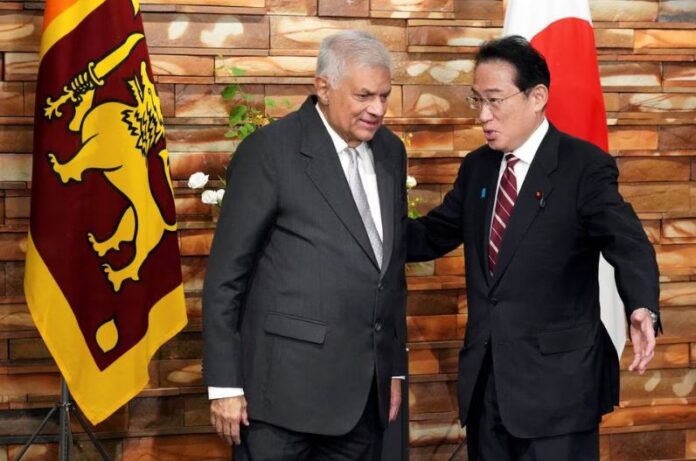By: Staff Writer
Colombo (LNW): President Ranil Wickremesinghe has expressed confidence in Sri Lanka concluding the newly-launched debt restructuring talks by September or November at the latest.
He made these remarks during a discussion with Japanese Prime Minister Fumio Kishida in Tokyo, yesterday.
Wickremesinghe stressed that the negotiations with creditors had made remarkable progress so far.
Sri Lanka secured a $ 2.9 billion bailout from the International Monetary Fund (IMF) in March, but the country must set up a debt restructuring framework by September to carry forward the program or risk undermining a slow economic recovery.
In April, France, India and Japan unveiled a common platform for talks among bilateral creditors to co-ordinate restructuring of the debt.
Sri Lanka defaulted on its foreign debt for the first time in its history in April 2022, which led to the worst financial crisis since independence
Sri Lankan fiscal and monetary authorities have just started discussions with the bilateral creditors on debt restructuring of US$ 7.1 billion out of the total $25.9 billion owed to external creditors.
Sri Lanka is now holding debt restructuring talks with Paris Club members together with India, while discussing with China separately.
Three baseline restructuring scenarios” with six-year maturity extension for all of them and nominal haircuts ranging from 15 per cent to 30 per cent, with higher coupons corresponding to lower haircuts have already been proposed reliable official sources said.
Each of the three baseline scenarios also implies roughly equal net present value relief of 23-28 per cent at the IMF’s preferred 5 per cent discount rate.
Sri Lanka indebted $7.1 billion to bilateral creditors, according to official government data, with $3 billion owed to China, $2.4 billion to the Paris Club and $1.6 billion to India.
The government will present a comprehensive plan for treating foreign as well as local debt to creditors this Month (before end May) , a senior finance ministry official involved in IMF negotiations said.
The delay in the releasing of the plan shows the difficulty the Sri Lanka authority face in balancing the demands of its bondholders, he said, adding that this will be raising the risks associated with the IMF’s $3 billion Extended Fund Facility (EFF) program.
“Sri Lanka’s total debt is $ 83.6 billion. Foreign debt amounts to $ 41.5 billion. Domestic debt amounts to $ 42 billion.
It is expected the restructuring negotiations will delay and extend till December against the government deadline of completing it by September, he claimed.
Under the IMF staff baseline scenario, $17 billion in debt service reduction is required, including the arrears accumulated in 2022.
Foreign creditors now demand to include domestic debt in the restructuring, which some Sri Lankan banks opposing but the government seeks to avoid talks that include pre-conditions.
According to several financial analysts and former top officials of the Central Bank local banks and licensed financial institutions will experience significant capital and Forex short fall as a result of sovereign debt restructuring.
The superannuation funds such as the EPF, ETF, NSB and Insurance Corporation will also be heavily exposed by this procedure, they added.
However, the government will have to fulfill several commitments under the IMF approved economic reform program to extend the currently improving economic performance and secure long-term recovery.
It has to establish an online transparency platform as soon as possible to publish, on a semi-annual basis, with information related to all significant public procurement contracts, a list of all firms receiving tax exemptions through the Board of Investment, and a list of individuals and firms receiving tax exemptions on luxury vehicle imports.
Other commitments are Parliamentary approval of welfare benefit payment scheme (Enhanced Social Safety Nets) by end May , Cabinet approval of a comprehensive strategy to restructure the balance sheets of key SOEs, Parliamentary approval of new anti-corruption legislation and the Parliamentary approval of the new Central Banking Act by end June.
Submitting the Public Financial Management (PFM) Law to Parliament for approval and the full revision of the Banking Act approval during Q3 and Q4 -2023.

